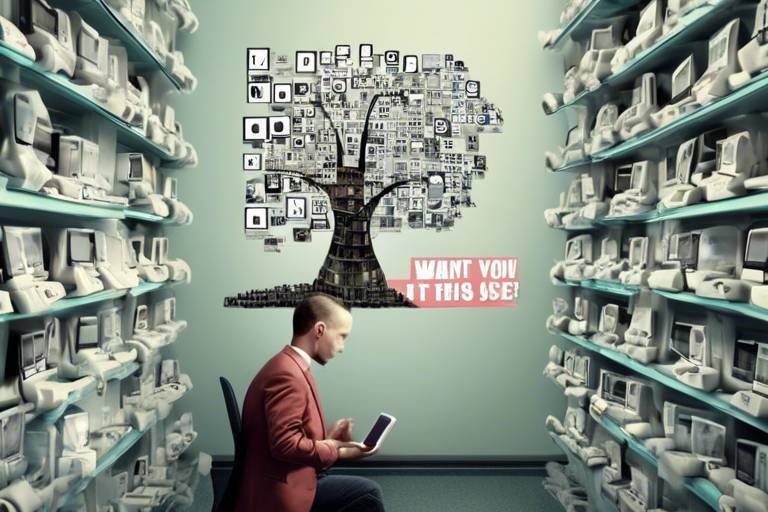How Technology is Changing the Nature of Friendship
In the whirlwind of modern life, technology has emerged as both a blessing and a challenge when it comes to friendships. It's fascinating to think about how our interactions have shifted from face-to-face conversations to digital exchanges, isn't it? As we navigate through this digital age, the nature of friendship has evolved dramatically, leading to both exciting opportunities and perplexing dilemmas. The way we connect, communicate, and even support one another has been transformed, and understanding this evolution is crucial in appreciating the friendships we have today.
Gone are the days when a long-distance friendship meant writing letters and waiting weeks for a reply. Digital communication has completely revolutionized how we connect with friends. With just a few taps on our devices, we can engage in instant messaging or hop on a video call, bridging the gap created by physical distance and time zones. Imagine being able to share a laugh or a tear with a friend across the globe in real-time! This immediacy has fostered relationships that might have otherwise faded away due to distance.
Social media platforms have become the new playgrounds for friendships. They allow us to maintain connections with a larger circle of acquaintances, but this also raises some important questions. Are we truly deepening our relationships, or are we merely skimming the surface? The quality and depth of friendships can sometimes take a backseat to the quantity of connections we have online. While it’s great to have a multitude of friends, it’s essential to reflect on whether these relationships bring genuine fulfillment or just a fleeting sense of belonging.
One of the most exciting aspects of technology is the opportunity to build new connections online. Online communities and forums have become a haven for individuals looking to meet others who share similar interests. Whether you're a fan of knitting, gaming, or even niche hobbies like birdwatching, there’s a community out there waiting for you. This ability to connect with like-minded individuals expands our social networks beyond geographical limitations, allowing friendships to blossom in the most unexpected places.
However, navigating the distinction between virtual friendships and real-life interactions is crucial. Many of us find ourselves juggling both worlds, and it can sometimes feel overwhelming. While virtual friendships can be deeply meaningful, they often lack the physical presence that enriches in-person relationships. Think of it like a favorite book: you can enjoy the story through the pages, but nothing compares to the feeling of holding that book in your hands, flipping through its pages, and experiencing the world it creates firsthand.
Online gaming is another fascinating realm where friendships are formed. It creates unique environments that foster connections through shared experiences and teamwork. Players often find camaraderie in their quests, battles, and achievements, leading to friendships that can feel just as real as those formed in person. The thrill of victory and the agony of defeat become shared moments that bond players together, transcending the limitations of traditional friendships.
Despite the conveniences that technology offers, maintaining friendships can be a challenge. Distractions abound, and the superficiality of online interactions can sometimes dilute the essence of true friendship. Miscommunication can easily arise in text messages or social media posts, leading to misunderstandings that might not occur in face-to-face interactions. It’s essential to be mindful of these challenges and actively work to nurture our relationships, ensuring they remain strong and meaningful.
Technology has also transformed how we seek and provide emotional support. In times of need, friends can turn to various platforms to share experiences and seek advice. The speed at which we can reach out for help is astonishing, yet it also raises questions about the depth of support we can offer through a screen. Are we truly being there for our friends, or are we merely sending a quick message to check in?
Online support groups have emerged as a valuable resource, offering individuals a space to connect with others facing similar challenges. These groups foster a sense of community and understanding, allowing friends to share their struggles and triumphs in a safe environment. It’s a beautiful reminder that even in a digital world, we can find solidarity and compassion.
Ultimately, finding a balance between digital communication and personal interactions is essential for nurturing meaningful friendships. While technology provides incredible tools for connection, it’s important not to let it replace the warmth of in-person interactions. So, how do we strike this balance? It requires intentionality—making an effort to meet friends face-to-face, even if it means scheduling it into our busy lives. After all, the best friendships are those that can thrive both online and offline.
- How has technology changed the way we communicate with friends? Technology allows for instant communication, making it easier to stay in touch regardless of distance.
- Are online friendships as meaningful as in-person friendships? While online friendships can be deep and fulfilling, they often lack the physical presence that enriches in-person relationships.
- What are the challenges of maintaining friendships in a digital age? Distractions, superficial interactions, and miscommunication can make it difficult to maintain strong friendships.
- How can I balance online and offline friendships? Make an effort to schedule in-person interactions while utilizing technology to stay connected.

The Rise of Digital Communication
In today's fast-paced world, digital communication has become the lifeblood of our social interactions. Gone are the days when we relied solely on handwritten letters or landline phones to keep in touch with friends. Now, with just a few taps on our smartphones, we can send instant messages, make video calls, and share our lives in real-time. This transformation has not only made it easier to connect but has also reshaped the very nature of friendships. Imagine being able to chat with a friend who lives halfway across the globe as if they were sitting right next to you!
The convenience of platforms like WhatsApp, Facebook Messenger, and Zoom has opened up a world of possibilities. We can now maintain relationships across time zones and geographical boundaries, fostering connections that would have been nearly impossible just a couple of decades ago. For example, a person in New York can easily share a laugh with a friend in Tokyo, bridging the distance with a simple video call. This immediacy and accessibility have made friendships more dynamic and fluid.
However, while the rise of digital communication has its perks, it also presents unique challenges. The sheer volume of interactions can sometimes lead to a feeling of superficiality. With so many friends to keep up with online, how do we ensure that our relationships remain meaningful? It's easy to send a quick text or like a photo, but how often do we engage in deeper conversations that truly strengthen our bonds? The quality of our interactions can sometimes take a backseat to the quantity.
Additionally, the distractions of digital life can pull our attention away from our friends. Notifications, social media scrolling, and the endless barrage of information can make it difficult to focus on the people who matter most. It's essential to find a balance between being digitally connected and genuinely present in our friendships. As we navigate this landscape, we must ask ourselves: Are we truly connecting with our friends, or are we merely skimming the surface?
Ultimately, the rise of digital communication has transformed the way we build and maintain friendships. It has provided us with tools to stay in touch and share experiences, but it also requires us to be more intentional about how we engage with one another. To foster deeper connections, we need to prioritize quality over quantity and find ways to blend our online interactions with real-life experiences. As we continue to embrace this digital age, let's remember that while technology can enhance our friendships, it cannot replace the value of face-to-face conversations and shared moments.

Social Media's Influence on Friendships
In today's fast-paced world, social media has become the lifeline of our friendships, reshaping how we connect, communicate, and maintain relationships. Platforms like Facebook, Instagram, and Twitter allow us to share snippets of our lives in real-time, creating an illusion of closeness despite physical distances. But, have you ever wondered if these digital interactions truly replace the depth of face-to-face conversations? While social media offers unprecedented access to our friends' lives, it also raises questions about the quality and authenticity of these connections.
On one hand, social media can be a fantastic tool for keeping in touch with friends from different phases of life. It allows us to celebrate milestones, share memories, and even vent about our bad days. You're just a click away from wishing your childhood buddy a happy birthday or sharing a laugh over a meme that reminds you of your college days. However, the quantity of friends on these platforms can sometimes overshadow the quality of our interactions. With hundreds or even thousands of online connections, how many of those relationships are genuinely meaningful?
Moreover, social media can create a false sense of intimacy. We often curate our online personas, presenting only the highlights of our lives. This can lead to feelings of inadequacy among friends who may compare their real lives to the seemingly perfect lives displayed on their screens. As a result, instead of fostering deeper connections, social media can sometimes breed superficiality and misunderstandings. It's essential to remember that behind every post, there’s a story, and not everything is as rosy as it seems.
Another intriguing aspect of social media's impact on friendships is the phenomenon of “friendship maintenance”. With the sheer volume of interactions available, it’s easy to fall into the trap of liking a post instead of reaching out personally. This can dilute the essence of friendship. Are we truly connecting, or are we merely skimming the surface? While a quick like or comment can show support, it often lacks the emotional weight of a heartfelt conversation.
Despite these challenges, social media does provide a platform for building new connections. Online groups and communities centered around shared interests can lead to friendships that might never have been formed in the offline world. For instance, if you're a fan of a niche hobby, you can easily find others who share your passion, regardless of where they are located. This opens the door to friendships that are based on common interests rather than geographical proximity.
In conclusion, while social media undeniably influences the way we form and maintain friendships, it’s crucial to strike a balance. Engaging in meaningful conversations, setting aside time for face-to-face interactions, and being mindful of the quality of our online engagements can help us navigate this digital landscape without losing the essence of true friendship.
- Does social media strengthen friendships? Yes, it can help maintain connections, but it’s important to ensure that these connections are meaningful.
- Can social media replace real-life interactions? While it can supplement friendships, it shouldn't replace face-to-face interactions, which are vital for deeper connections.
- What are the downsides of social media on friendships? It can lead to superficial connections, feelings of inadequacy, and miscommunications.
- How can I maintain meaningful friendships on social media? Focus on quality interactions, engage in personal conversations, and try to meet in person when possible.

Building New Connections Online
In today's fast-paced digital world, the opportunity to build new connections online has never been more accessible. Gone are the days when geographical barriers limited our social circles. Now, with just a click, we can connect with individuals from all corners of the globe. This is akin to opening a window to a vast universe of potential friendships, where every interaction can lead to something meaningful. But how do we navigate this digital landscape to form genuine connections?
Online platforms such as social media, forums, and interest-based communities have become the new meeting grounds for like-minded individuals. Imagine walking into a bustling café filled with people who share your passions. This is the essence of online communities. Whether it's a Facebook group dedicated to book lovers, a subreddit for gamers, or a Discord server for artists, these spaces foster an environment where friendships can blossom. Here, you can share your thoughts, engage in discussions, and even collaborate on projects, all while building a sense of camaraderie with others who resonate with your interests.
One of the most exciting aspects of online connections is the ability to meet people you might never encounter in your everyday life. For instance, you could be chatting with someone from a different continent who shares your love for a niche hobby. This not only broadens your perspective but also enriches your life experiences. However, while the digital realm offers vast opportunities, it also requires a degree of caution and awareness. It’s essential to approach these new relationships with a blend of openness and discernment.
To make the most of your online interactions, consider the following tips:
- Be Authentic: Authenticity is key in any relationship. Share your true self, and you'll attract like-minded individuals.
- Engage Actively: Don't just lurk in the shadows. Participate in discussions, comment on posts, and share your insights.
- Be Respectful: Different opinions are part of the beauty of online communities. Engage respectfully, even when disagreements arise.
- Take Your Time: Building trust takes time. Don’t rush into deep conversations; let relationships develop organically.
Ultimately, building new connections online can be a rewarding experience if approached with the right mindset. As we navigate this digital landscape, we must remember that while technology can facilitate friendships, the essence of connection—trust, respect, and understanding—remains the same. So, whether you're sharing memes, discussing your favorite TV shows, or collaborating on a project, embrace the journey of making new friends in this ever-evolving digital age.
Q: Can online friendships be as meaningful as in-person ones?
A: Absolutely! Many online friendships develop through shared interests and experiences, leading to deep connections. However, it's essential to balance online interactions with in-person meetings when possible.
Q: How can I ensure safety while making friends online?
A: Always prioritize your safety. Avoid sharing personal information too soon, and consider video chatting before meeting someone in person.
Q: What should I do if I feel overwhelmed by online interactions?
A: It's okay to take a step back. Set boundaries for your online engagement and prioritize self-care to avoid digital burnout.

Virtual Friendships vs. Real-life Interactions
The concept of friendship has evolved dramatically in our digital age, leading to a fascinating debate between virtual friendships and real-life interactions. While the internet has made it easier than ever to connect with people from all over the world, it raises the question: can these online connections truly replace the depth and intimacy of face-to-face friendships? It's like comparing apples to oranges—both have their merits, but they serve different purposes in our lives.
Virtual friendships often blossom in online spaces where individuals can bond over shared interests, gaming, or even social media platforms. These connections can be incredibly fulfilling, allowing people to express themselves freely without the constraints of physical presence. However, the challenge lies in the superficiality that may accompany these relationships. For instance, how often have you scrolled through a friend's social media feed and felt connected, yet never actually engaged in a meaningful conversation? This phenomenon highlights a critical aspect of virtual friendships: while they can be widespread and diverse, they may lack the emotional depth that comes from real-life interactions.
On the other hand, real-life friendships offer a level of connection that is hard to replicate online. There’s something magical about sharing a laugh in person, feeling the warmth of a hug, or simply being present with someone during a tough time. These experiences create a tapestry of memories that form the foundation of strong relationships. In-person interactions tend to foster a deeper understanding of each other’s emotions and nonverbal cues, which can often be lost in the digital translation. The nuances of human interaction—like body language and tone of voice—are critical components that enrich our relationships.
However, it's essential to recognize that the lines between virtual and real-life friendships are increasingly blurred. Many friendships today begin online and transition to real-life meetings, creating a hybrid model that combines the best of both worlds. For example, individuals who meet in online gaming communities often move their friendships offline, meeting up at conventions or local events. This blend of virtual and real-life interactions can enhance the richness of friendships, allowing individuals to experience the excitement of new connections while still enjoying the comfort of established relationships.
Ultimately, the key to navigating this landscape is balance. Embracing both virtual friendships and real-life interactions can lead to a more fulfilling social life. It’s about understanding the unique qualities each type of friendship brings to the table. By valuing both, we can create a diverse and supportive network of friends that enhances our lives in various ways. So, are you ready to embrace the best of both worlds? The choice is yours!
- Can virtual friendships be as meaningful as real-life friendships? Yes, many virtual friendships can be deeply meaningful, especially when they transition into real-life interactions.
- How can I maintain my virtual friendships? Regular communication through video calls, messaging, and social media interactions can help keep virtual friendships strong.
- What are the downsides of virtual friendships? They might lack emotional depth and the nonverbal cues that come with in-person interactions, leading to potential misunderstandings.
- Is it possible to have a balance between virtual and real-life friendships? Absolutely! Embracing both types of friendships can lead to a richer social life.

The Role of Online Gaming
Online gaming has emerged as a powerful force in shaping friendships in the digital age. Imagine stepping into a virtual world where you can team up with friends or even meet new ones from across the globe. This isn’t just a game; it’s a vibrant community where shared experiences create lasting bonds. The thrill of conquering a challenging quest together or strategizing to defeat a common enemy can forge friendships that feel just as real as those formed in person.
One of the most fascinating aspects of online gaming is how it transcends geographical barriers. Players can connect with others who share their interests, regardless of where they live. This opens up a treasure trove of opportunities for social interaction. For instance, a player in New York can form a close friendship with someone in Tokyo, united by their love for the same game. The camaraderie built in these virtual spaces can lead to friendships that might never have been possible otherwise.
Moreover, the nature of online gaming encourages teamwork and communication. Players often need to collaborate to achieve goals, which fosters a sense of unity and shared purpose. This collaborative spirit is essential in building trust and understanding among players. The excitement of strategizing together, sharing tips, and celebrating victories can strengthen these connections. It’s like being part of a sports team, where every player has a role to play, and every victory is celebrated as a collective achievement.
However, it’s important to recognize that online gaming friendships can differ significantly from traditional friendships. While they can be incredibly fulfilling, they often lack the physical presence that comes with in-person interactions. Players may find themselves navigating a unique set of dynamics, where the relationship is primarily based on the gaming experience rather than shared daily life. This can lead to a fascinating blend of virtual and real-life interactions, as players may eventually choose to meet in person or continue their friendship solely online.
In conclusion, online gaming plays a crucial role in the modern landscape of friendships. It not only provides a platform for social interaction but also fosters deep connections through shared experiences. As technology continues to evolve, so too will the ways in which we connect with one another, making online gaming a significant player in the friendship game.
- Can online gaming lead to real-life friendships?
Absolutely! Many gamers transition from online interactions to real-life friendships, often meeting in person after building a strong bond online. - What are the benefits of friendships formed through online gaming?
These friendships can offer emotional support, shared interests, and a sense of belonging, much like traditional friendships. - Are online gaming friendships as meaningful as in-person friendships?
While they can be different, many find that online gaming friendships can be just as meaningful, especially when built on trust and shared experiences.

Challenges of Maintaining Friendships
In today's fast-paced digital world, maintaining friendships can feel like trying to catch smoke with your bare hands. The convenience of technology often comes with a hidden cost, making it challenging to nurture connections that truly matter. With our lives increasingly intertwined with screens, distractions abound, pulling our attention away from meaningful interactions. It's not uncommon to find ourselves scrolling through social media feeds instead of picking up the phone to call a friend. This phenomenon raises a critical question: Are we sacrificing the quality of our friendships for the sake of convenience?
Moreover, the superficial nature of online interactions can sometimes leave us feeling more isolated than connected. While it's fantastic to see what our friends are up to through posts and updates, these interactions often lack the depth and warmth of face-to-face conversations. A simple "like" or a comment on a photo can never replace the genuine laughter shared over coffee or the comforting presence of a friend during tough times. This brings us to another challenge: the potential for miscommunication. In the absence of non-verbal cues, messages can easily be misinterpreted, leading to misunderstandings that can strain relationships.
As we navigate this digital landscape, it's essential to recognize the importance of intentionality in our friendships. Here are some challenges we face:
- Distractions: With notifications pinging from every direction, it's easy to lose focus during conversations.
- Superficial Connections: The ease of connecting online can lead to a quantity-over-quality mindset.
- Miscommunication: Texting lacks tone and body language, often resulting in confusion.
These challenges can create a disconnect, making it harder to maintain the bonds that once felt so effortless. However, it's not all doom and gloom! Awareness is the first step toward overcoming these obstacles. By being mindful of how we engage with our friends, we can prioritize deeper connections. Scheduling regular catch-ups, whether virtually or in-person, can help bridge the gap created by technology. After all, friendships are like plants; they need care and attention to thrive. So, let’s not forget to water them with our time and presence!
Q1: How can I maintain friendships in a digital world?
A1: Prioritize regular check-ins, schedule virtual hangouts, and make an effort to meet in person when possible. Being intentional about your time can foster deeper connections.
Q2: What are some signs that my friendship is becoming superficial?
A2: If conversations feel one-sided, lack depth, or if you find yourself only communicating through social media, it may be time to reassess the relationship.
Q3: How do I handle misunderstandings that arise from digital communication?
A3: Address misunderstandings promptly by discussing them directly. A phone call or face-to-face conversation can often clear up confusion more effectively than text.

The Impact of Technology on Emotional Support
In today's fast-paced world, technology has become a lifeline for many, particularly when it comes to emotional support. Imagine being able to reach out to a friend at any hour of the day, sharing your worries or joys with just a few taps on your smartphone. This instant connectivity has fundamentally changed how we seek comfort and understanding from our friends. No longer do we have to wait for a face-to-face meeting; we can express our feelings in real-time, making emotional support more accessible than ever.
However, while technology has its perks, it also poses challenges. The sheer volume of interactions can sometimes lead to feelings of overwhelm. With so many platforms available—texting, social media, and video calls—how do we determine which medium is best for sharing our feelings? Each platform has its own vibe; for instance, a quick text may suffice for light-hearted banter, but a video call might be more appropriate for discussing deeper issues. Choosing the right method can feel like navigating a maze!
Moreover, technology has given rise to online support groups, which serve as a sanctuary for individuals facing similar challenges. These groups can be a game-changer for many, providing a sense of community that transcends geographical boundaries. For example, someone dealing with anxiety can join a forum where they can share experiences and coping strategies with others who truly understand their struggles. The anonymity offered by these platforms often encourages individuals to open up more than they might in person, leading to meaningful exchanges and emotional relief.
Yet, it's essential to remember that while online platforms can provide immediate support, they shouldn't replace personal interactions. The nuances of human emotion often get lost in translation through screens. A comforting hug or a reassuring presence can be far more impactful than a text message. Therefore, it's vital to strike a balance between digital and personal connections. When you're feeling down, consider reaching out to a friend for a face-to-face chat instead of just sending a message. The emotional warmth of real-life interactions can be incredibly healing.
In conclusion, technology has undeniably transformed the landscape of emotional support, making it easier to connect with others. However, as we embrace these advancements, we must remain mindful of the importance of personal interactions. The key to nurturing emotional well-being lies in balancing the convenience of digital communication with the richness of in-person connections.
- How has technology changed emotional support?
Technology has made emotional support more accessible through instant communication, online support groups, and social media, allowing individuals to connect with others in real-time. - Are online support groups effective?
Yes, online support groups can be very effective as they provide a sense of community and understanding among individuals facing similar challenges. - How can I balance online and personal interactions?
To balance online and personal interactions, prioritize face-to-face meetings for deeper conversations and use digital platforms for quick check-ins or light-hearted chats.

Online Support Groups
In today's fast-paced world, have emerged as a vital resource for individuals seeking connection and understanding. These virtual spaces allow people to share their experiences, struggles, and triumphs with others who are navigating similar challenges. Imagine a cozy café where everyone speaks the same language of empathy and support; that's the essence of online support groups. They provide a platform for individuals to express their feelings without fear of judgment, fostering a sense of belonging that many may not find in their immediate surroundings.
One of the most significant benefits of online support groups is their accessibility. No matter where you are in the world, a simple internet connection can open the door to a community that understands your journey. Whether you're dealing with mental health issues, chronic illness, or even the ups and downs of daily life, these groups offer a lifeline. For instance, platforms like Facebook, Reddit, and specialized websites host countless groups dedicated to various topics, from anxiety support to parenting challenges. This diversity allows individuals to find a niche that resonates with their specific needs.
Moreover, online support groups often allow for anonymity, which can be a double-edged sword. On one hand, anonymity can encourage more honest sharing, as participants might feel safer discussing sensitive topics without revealing their identities. On the other hand, it can sometimes lead to less accountability and the potential for negative interactions. However, many groups have moderators who ensure that the environment remains supportive and respectful. For example, a well-moderated group might have guidelines like:
- Respect everyone's privacy.
- No hate speech or bullying.
- Focus on constructive feedback.
As we delve deeper into the impact of technology on friendships, it's crucial to recognize that while online support groups can be incredibly beneficial, they should not completely replace face-to-face interactions. The human touch—whether it's a hug, a shared laugh, or simply being present—adds a layer of emotional depth that virtual communication sometimes lacks. Finding the right balance between online support and personal connections is key to nurturing meaningful relationships.
In conclusion, online support groups represent a powerful tool for fostering connections and providing emotional support in a digital age. They create communities that transcend geographical barriers, allowing individuals to find solace in shared experiences. As we navigate the complexities of modern friendships, embracing these online platforms while also cherishing our in-person relationships can lead to a more fulfilling social life.
Q: What are online support groups?
A: Online support groups are virtual communities where individuals can share their experiences and challenges related to specific topics, such as mental health or chronic illness, providing mutual support and understanding.
Q: How do I find an online support group?
A: You can find online support groups through social media platforms, forums, or dedicated websites that focus on your area of interest. Search for keywords related to your needs to discover available options.
Q: Are online support groups safe?
A: While many online support groups are moderated to ensure a safe environment, it's essential to exercise caution. Look for groups with clear guidelines and active moderation to ensure a positive experience.
Q: Can online support groups replace in-person interactions?
A: While online support groups offer valuable connections, they should complement, not replace, in-person interactions. Both forms of communication play essential roles in emotional well-being.

Balancing Digital and Personal Connections
In today's fast-paced world, where our lives are increasingly intertwined with technology, finding a balance between digital and personal connections is more crucial than ever. Imagine a world where your best friend lives just a text away, yet you haven’t seen them in person for months. Sounds familiar, right? While digital communication offers incredible convenience, it can sometimes create a false sense of intimacy, leaving us feeling disconnected despite being constantly "plugged in."
To truly nurture meaningful friendships, we must consciously make an effort to step away from our screens and engage in real-life interactions. Think of it like tending to a garden; if you only water the plants with a hose (i.e., digital communication), they may survive, but they won’t thrive. In-person interactions add the nutrients that help friendships blossom. This doesn't mean we should abandon our digital connections altogether; rather, we should integrate them in a way that enhances our relationships instead of replacing them.
One effective approach is to schedule regular meet-ups with friends, whether it’s a weekly coffee catch-up or a monthly game night. These face-to-face interactions allow us to share experiences, laugh together, and create lasting memories. Additionally, consider using technology to enhance these personal connections. For example, you can use video calls to stay in touch with friends who live far away, but try to limit these calls to ensure they complement, rather than replace, in-person gatherings.
Moreover, it’s essential to be mindful of how much time we spend on social media. While platforms like Facebook and Instagram can help us stay connected, they can also lead to feelings of inadequacy or loneliness if we’re not careful. A study found that excessive social media use can negatively impact our mental health and overall well-being. So, why not set boundaries for yourself? Perhaps designate specific times during the week to check your social media, allowing you to focus on the people physically present in your life during the rest of the time.
In conclusion, finding the right balance between digital and personal connections is like walking a tightrope; it requires constant adjustment and awareness. By making a conscious effort to prioritize in-person interactions while still leveraging the advantages of technology, we can cultivate friendships that are not only present but also profoundly fulfilling. Remember, the goal is not to eliminate digital connections but to ensure they enhance our lives rather than dominate them.
- How can I strengthen my friendships in a digital age? Focus on scheduling regular face-to-face meet-ups and limit your time on social media.
- Is it possible to have meaningful friendships online? Yes, but it's essential to balance online interactions with in-person connections for deeper relationships.
- What are some signs that I need to reconnect with friends in person? Feelings of loneliness, superficial conversations, or relying solely on digital communication are indicators.
Frequently Asked Questions
- How has technology changed the way we communicate with friends?
Technology has revolutionized communication by allowing instant messaging, video calls, and social media interactions. This means we can connect with friends across the globe in real-time, making it easier to maintain relationships despite distance.
- Does social media improve or harm friendships?
While social media can help us stay connected with a larger circle of friends, it often raises concerns about the quality of those relationships. Sometimes, online interactions can feel superficial, leading to questions about whether we’re truly connecting with others.
- Can virtual friendships be as meaningful as in-person ones?
Absolutely! Many people find that virtual friendships can be just as deep and fulfilling as face-to-face relationships. The key is to engage meaningfully with your online friends and invest time in building those connections.
- What role do online gaming communities play in friendships?
Online gaming creates unique opportunities for friendship through teamwork and shared experiences. Gamers often bond over challenges and victories, forming strong connections that can translate into real-life friendships.
- What challenges do people face in maintaining friendships in the digital age?
Maintaining friendships can be tough due to distractions from technology, the superficial nature of online interactions, and the potential for miscommunication. It’s essential to make a conscious effort to engage deeply with friends, both online and offline.
- How can technology provide emotional support?
Technology offers various platforms for sharing experiences and seeking advice, such as online support groups and forums. These spaces can help individuals connect with others facing similar challenges, creating a sense of community and understanding.
- How can I balance digital communication with personal interactions?
Finding a balance is crucial for nurturing meaningful friendships. Set aside time for face-to-face interactions, and be intentional about your online communication to ensure you’re building genuine connections.



















